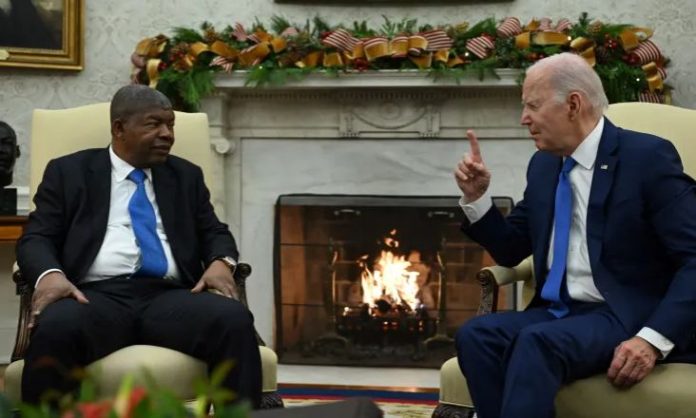Joe Biden’s planned trip to Angola on October 13 was meant to be historic. It would have been his first visit to Africa during his tenure as president of the United States.
But as Hurricane Milton advanced on Florida last week, the White House postponed the trip to an unspecified date, alongside a visit to Germany where Biden was scheduled to talk to European leaders about the Ukraine war before heading to Luanda.
The outgoing US president’s trip was him finally making good on several promises to visit Africa. For Angola, the visit was set to deliver a diplomatic victory for President Joao Lourenco’s troubled government while giving the Southern African nation regional bragging rights as Washington’s chosen country after a decade’s absence.
While the cause of the postponement is reasonable, critics say Biden never really seemed keen on prioritising Africa in the first place, even as rival world powers like China and Russia aggressively expand their footprints on a continent they consider important for its significant natural resources, rapidly growing population, and sizeable voting bloc in the United Nations.
Since Biden’s election into office in 2020, he has not set foot in any African country, despite his administration insisting that it prioritises the needs of the continent’s 1.3 billion people and respects its leaders. In contrast, Biden has managed to travel to Europe several times – five times to the United Kingdom alone – as well as to countries in the Middle East, Asia and Latin America.
“The Biden administration has fallen short of its own rhetoric,” Cameron Hudson, a senior Africa analyst at the US-based Center for Strategic and International Studies, told Al Jazeera. Even the Luanda trip appeared as a “hastily organised” last-ditch attempt for the president as he approached his final months in office, Hudson added.
US politics, Canada’s multiculturalism, South America’s geopolitical rise—we bring you the stories that matter.
“Ironically, [an Africa trip] probably matters more to Biden, who is searching to establish a legacy in Africa and wants to make good on a promise he has made repeatedly, than for Africa, which is already preparing for his successor.”
Big promises, little action
Biden first promised to visit Africa in December 2022. He was talking with 49 African leaders who had gathered in Washington, DC for the US-Africa Leaders Summit.
The summit was held when US influence on the continent had already waned drastically: China overtook the US in trade volume with Africa in 2019. Since 2021, countries in the West African Sahel region have also turned to Russia for security partnerships – even kicking out Western and US troops stationed there.
After a feast in the White House, Biden made solemn promises to his counterparts: the US would work to see that African countries get permanent seats at the UN Security Council (UNSC) – a goal that the African Union (AU) has pursued for 20 years.
Washington would also see that the AU is recommended to join the Group of 20, he added, to loud applause from the grinning leaders. The group represents two-thirds of global gross domestic product (GDP) and trade.
“The United States is all in on Africa and all in with Africa,” Biden declared. “Africa belongs at the table in every room – in every room where global challenges are being discussed and in every institution where discussions are taking place.”
A $55bn support package to the AU for healthcare, infrastructure and a host of other sectors topped off the hearty speech.
However, many of the promises have not been achieved, Hudson said. Biden’s failure to match his actions with his words comes largely from the administration’s initial laxness to the continent, he added.
Indeed, Biden’s White House did not pursue and publish a policy document outlining its planned relations with Africa until August 2022.
“That only left him two years to build a legacy, which isn’t enough time to have much real impact and evidently even less time to organise a visit to the continent,” Hudson said.
When it surfaced, analysts called the much-anticipated Africa Strategy document “ambitious” and “modern”. It shifted away from former President Donald Trump’s focus on trade relations and tracking aid dollars by promising to elevate African representation at international global institutions, strengthening economies and boosting climate adaptation.
However, enthusiasm around the policy dampened gradually, especially after Biden’s exit from the presidential race in July.
Some experts note that Biden clinched some wins. The AU was admitted as a permanent member of the G20 in September 2023. US ambassador to the UN Linda Thomas-Greenfield also announced last month that her country would support two permanent UNSC seats for Africa – although, she caveated, without veto power.
Biden also deployed a flurry of US officials to the continent. Secretary of State Antony Blinken has made four trips to Africa. In the last one in January, he caught an African Cup of Nations game in Ivory Coast and helped mediate peace between disputing neighbours Rwanda and the Democratic Republic of the Congo (DRC).
Vice President Kamala Harris too was in Ghana, Tanzania, and Zambia for a week in March 2023, alongside Second Gentleman Doug Emhoff.
US AFRICA
US vs China and Russia
However, pushing for Africa to have a permanent seat on the UNSC without veto power is akin to relegating its citizens to the second-class category, Tim Murithi, a professor and research associate at the University of Cape Town, argued in South Africa’s Daily Maverick.
“In effect, Africa would once again be confined to the status of spectators in UNSC decisions that affect the lives of its people, repeating the historical exclusion of African countries that transpired in June 1945 when the UN was formally established in San Francisco,” Murithi wrote, referring to a time when most African countries were still colonised and not represented at the body.
Besides, Blinken and Harris’s visits do not carry the needed weight, Hudson said. Biden’s former boss, President Barack Obama, visited Africa eight times.
“Presidential trips to Africa are rare enough that they always matter, though admittedly, this one would matter less coming as it does at the very end of a lame-duck presidency,” he added.
In contrast, China’s Xi Jinping has visited the continent thrice. His last visit was to South Africa in August 2023 for a summit of BRICS (Brazil, India, China, and South Africa) – a group analysts say wants to rival the Group of Seven countries. When African leaders travelled to Beijing for the China-Africa summit in September, analysts noted how Xi met many African leaders one-on-one and took them on a tour of the capital.
Russia’s Vladimir Putin too was in South Africa in 2013 for a BRICS meeting. He was forced to join last year’s meeting digitally due to international pressure on Pretoria to arrest him based on warrants issued by the International Criminal Court in March 2023 for his war in Ukraine.
Even Biden’s decision to visit Angola – if that happens – is faulty, critics say. Both sides have touted deepening trade and military ties, as well as increased air connectivity. They even signed a space exploration deal last year.
More importantly, though, Angola is attractive to the US because of the Lobito Corridor, an unfinished $1bn railway project that will see precious minerals from the DRC transported to Angola’s Lobito port.
The US has pumped $3bn into the project. However, some say that this appears to be Biden’s biggest legacy on the continent is odd. The deal ultimately focuses on taking resources and resembles the “exploitation” the US has accused China of undertaking on the continent, some note.
While Biden’s government lauds Angola as a close ally and “regional leader”, some Angolans are sceptical of the relationship.
President Lourenco’s government is deeply unpopular because of high living costs, corruption, and mounting human rights abuses. In June, authorities opened fire on protesters angry at inflation, killing eight people in the central Huambo province. Several others were arrested in cities across the country.
Lourenco’s People’s Movement for the Liberation of Angola (MPLA) party, which has been in power since independence from Portugal in 1975, is also in the throes of an internal power struggle that has weakened the president’s image.
Biden has not mentioned these rights issues – not even when he hosted Lourenco in the White House last November. His closeness to Lourenco, experts say, could be seen as emboldening the Angolan government.
“Lourenco has invested heavily in lobbying efforts to improve his image in Washington. However, at home, he faces protests,” said Florindo Chivuvute, director of Friends of Angola, a group advocating for stronger democratic values in Angola and based in Luanda and Washington, DC.
“[The US] should not compromise its core values of democracy and human rights in an attempt to catch up. These values distinguish the US from China and resonate with Angolans,” he said.
Angola warmed to the US only recently. Historically, the country leaned towards Russia, and in the early 2000s, towards China. The last government opted for Chinese loans rather than from institutions like the World Bank.
However, many Angolans saw that as only benefitting the political elite because of a notorious obscurity experts say is connected with Chinese funding.
For Biden, wrenching Angola from China or Russia might be seen as a success, but experts say it is not one many Angolans recognise.
With his term all but over, there is little Biden could do now to boost his weak African legacy, analysts say.
Even the few successes he scored now hinge on who he will pass the baton to, Hudson said. While Harris might not sway too far from her predecessor, Trump’s “shithole” nations comment about African countries is still fresh for many.
Biden’s unfulfilled promises will always be a stain, though.
“The problem with unmet expectations is that they sting more than promises never made,” Hudson said.
“Ultimately, it is less the Biden administration’s policies toward Africa that will be judged than the gap between those policies and the expectations the administration set.”

















